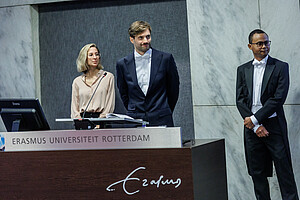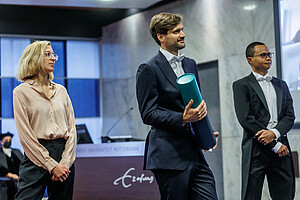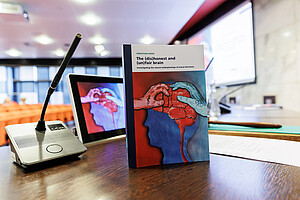PhD Defence Sebastian Speer

In his dissertation Sebastian provided three contributions to better understand the neurocognitive underpinnings of individual differences in moral decision-making. First, it provides reconciliation of a long-standing debate in the literature on the role of cognitive control in (dis)honesty. Second, he contributed by identifying stable neural markers that can be used to predict individual differences in (dis)honesty. Lastly, Sebastian provided a behavioral paradigm that can be used to inconspicuously measure voluntary, spontaneous and repeated cheating on a trial-by-trial basis in the MRI scanner or while recording EEG. Sebastian defended his dissertation on Friday, 19 November at 13:00h. His supervisors were Prof. Ale Smidts (RSM) and Dr Maarten Boksem (RSM). The members of the Doctoral Committee were Prof. Eveline Crone (ESSB), Prof. Alan Sanfey (Radboud University), Prof. Nobuhito Abe (Kyoto University), Prof. Valeria Gazzola (Netherlands Institute of Neuroscience), and Prof. Shaul Shalvi (University of Amsterdam).
About Sebastian Speer

Sebastian Speer was born in Bad Friedrichshall, Germany. He received his Bachelor’s degree in Psychology from the University of Groningen (cum laude). Subsequently, he obtained his Master’s degree in Cognitive Neuroscience from the University of Amsterdam (cum laude). In 2016, he started his PhD research in Neuroeconomics at the Erasmus Research Institute of Management, specializing in social neuroscience with a focus on morality.
In his research, he investigates the psychological and neural underpinnings of decisions to either cheat and deceive, or to remain fair and honest. To do so he combines neuroimaging with behavioral experiments. His work has been published in top interdisciplinary journals such as the Proceedings of the National Academy of Sciences of the United States of America as well as in several neuroscience journals such as the Journal of Neuroscience, Social Cognitive and Affective Neuroscience and Frontiers in Neuroscience. He also presented his work at major international conferences, including the Annual Conference of the Society for Neuroeconomics and the Interdisciplinary Symposium for Decision Neuroscience.
In September 2021 he started working as a postdoctoral researcher at the Netherlands Institute for Neuroscience, Amsterdam.
Thesis Abstract

Our lives abound with situations that confront us with a conflict between selfish urges and virtuous alternatives that benefit others. Not everyone solves this conflict in the same manner. While highly virtuous individuals may devote their lives to improve the condition of the oppressed or the less fortunate, more selfish individuals, tend to focus on maximizing their own gains and in some cases even exploit others. These large differences in how individuals weigh their own benefits against moral standards and social norms that may benefit the welfare of others, are pivotally important in understanding moral decision-making that is the fundament of cooperation in organizations and society at large. This dissertation provides three contributions to better understanding the neurocognitive underpinnings of individual differences in moral decision-making. First, it provides reconciliation of a long-standing debate in the literature on the role of cognitive control in (dis)honesty, by showing that the role of cognitive control depends on a person’s moral default: cognitive control helps cheaters to be honest, but also helps honest people cheat. Second, this dissertation contributes by identifying stable neural markers that can be used to predict individual differences in (dis)honesty. Stronger connectivity between brain regions associated with self-referential thinking and reward are predictive of honesty. Lastly, the dissertation provides a behavioral paradigm that can be used to inconspicuously measure voluntary, spontaneous and repeated cheating on a trial-by-trial basis in the MRI scanner or while recording EEG.
View photos of Sebastian's PhD Defence
Photos: Chris Gorzeman / Capital Images


